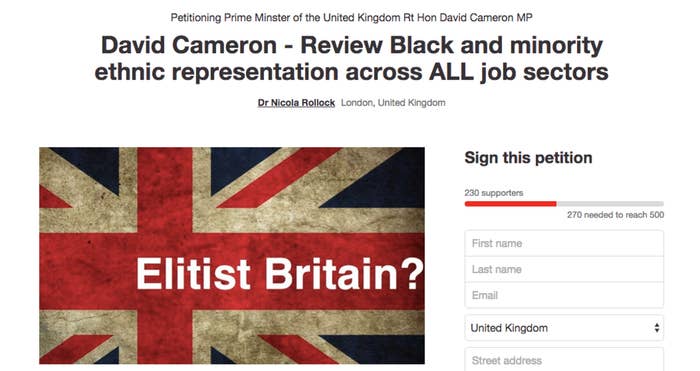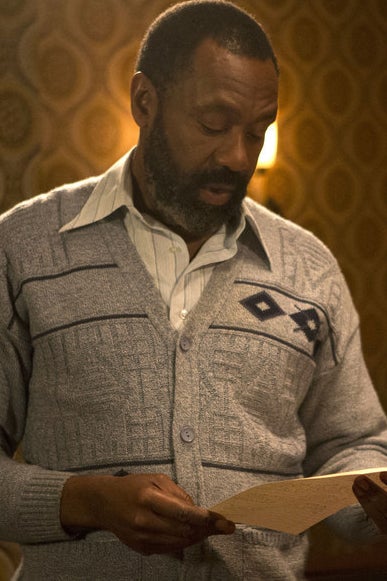A petition has been launched calling for the prime minister to review black and ethnic minority representation across all job sectors.

The call to action comes after the business secretary Sajid Javid called for a review into the obstacles that prevent black and Asian professionals from progressing in their careers earlier this month.
The review, which forms part of the prime minister's plan to end discrimination and increase social mobility by 2020, will look at issues faced by businesses in developing BME talent from when they enter the job market through to executive level.
It will also consider the obstacles faced by BME people, the impact of these obstacles on individuals and businesses, and evidence-based interventions.
The effort will be led by Conservative peer Baroness McGregor-Smith, the only female Asian chief executive of a FTSE 250 company.

Nicola Rollock, who started the petition, told BuzzFeed News that she welcomes the government’s decision to look into these issues but believes their review should not be "limited to business".
Rollock, an academic at the University of Birmingham, said that the review needs to be extended to look at the challenges people of colour face across all job sectors, including health, policing and law, which is part of a "wider problem" that needs to be acknowledged by the government.
I've started a petition for @David_Cameron to review BME retention & snr level representation across ALL sectors. https://t.co/nKVNMrkxtt
Rollock said nearly 300 people have signed the petition since it launched on 16 February. She said that was "struck" by looking at the diversity of signatories in terms of age, race, and, gender, but also at the number of people who realised that they weren't alone in experiencing these challenges.
"A lot of people say 'great', 'brilliant', 'it's about time', which is wonderful. Some people say 'oh my gosh, I thought it was just me in my individual workplace. I didn't realise it was a wider problem'," she said.
Rollock, who is often invited to speak about race on panels across different sectors, said that people often approach her to share their stories, experiences, and frustrations with the lack of progression and their perceived discrimination in the workplace.
"People believe that they're being overlooked, their talents aren't recognised, they're ignored, or they're put down," she said.
Rollock is concerned that these issues occur across all job sectors, and have existed in the UK for "quite a long time".
She told BuzzFeed News that she remembers looking at the same issue back in 2008, when she was asked to carry out an independent review of the government progress in recommendation of the Stephen Lawrence inquiry. Since that time she believes that there has been "very minimal" progress in terms of addressing the retention and progression of black and ethnic minority staff.
As well as hoping to urge the government to extend their review so that it's not limited to business, Rollock would like her petition to start a "progressive conversation" about race equality in the UK.
"As a society we're really, really uncomfortable talking about race," she said.
"People get angry and defensive, so I would like to open up a more complex and a progressive conversation about race equality in British society."
Black employees earn less than their white counterparts at every level according to figures from Trades Union Congress' (TUC) most recent report.
The finding showed that black employees with degrees earn an average of £14.33 per hour, while their white equivalents earn an average of £18.63 for the same amount of work.
On average BME workers with degrees earn around 10% less than their white counterparts.
For black and white workers without degrees that gap widens. Black workers with GCSEs earn 11.4% less than their white counterparts on average, and for black workers with A-Levels the gap increases to 14.3%.
In 2014 research conducted by Middlesex university found that BME staff within the NHS face discrimination when it comes to career progression.
The report – called the the Snowy White Peaks of the NHS – cited research studies that suggested NHS recruitment processes disproportionately favoured white applicants, and highlighted concerns about the absence of black and minority ethnic NHS staff.
A number of BME actors have also spoken out about the number of "talented" ethnic minority actors leaving the UK because they don't believe their skills and talents are being recognised in the creative industries.


Both Idris Elba (left) and Sir Lenny Henry have spoken about British actors leaving the UK because of the lack of recognition and stereotyped roles for ethnic minorities.
In 2014, giving the annual Bafta Television lecture, comic Sir Lenny Henry said that since 2008 he's noticed a "worrying trend" of "frustrated" BME actors going to America to succeed.
In a speech at the House of Commons in January, actor Idris Elba condemned British broadcasters for failing to put enough minority actors on screen. Elba, who got his big break in the United States after landing a role in the drama The Wire said that the BME actors on screen are usually given racially stereotyped and "one dimensional" roles.
"Are black people often playing petty criminals?" he said. "Are women always playing the love interest or talking about men? Are gay people always stereotyped? Are disabled people hardly ever seen?"
